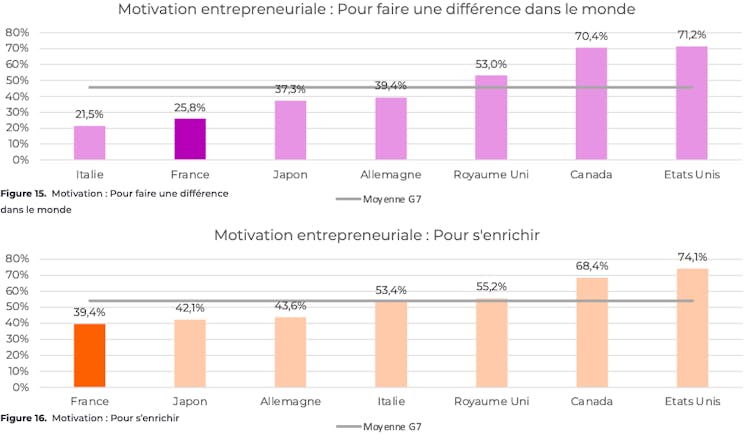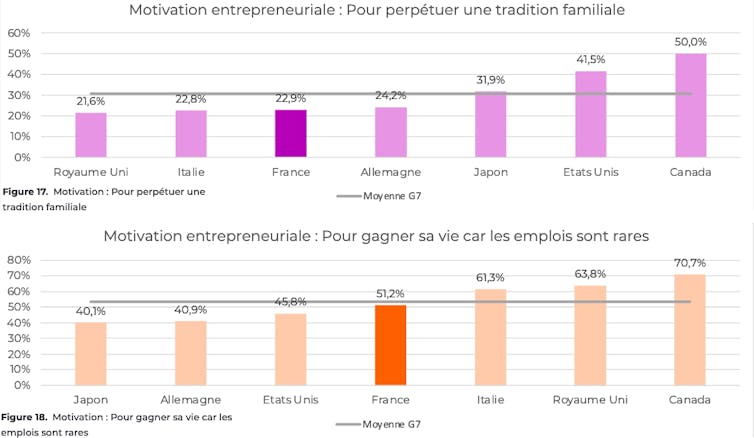Is the entrepreneurial culture really more developed elsewhere than in France?
Entrepreneurship is a key driver of social health and wealth. It is also a formidable engine of economic growth.
Karim Messeghem, University of MontpellierFrank Lasch, Montpellier Business School and Justine Valette, University of Montpellier

It fosters the innovation needed not only to exploit new opportunities, promote productivity and create jobs, but also to tackle some of society's biggest challenges, such as the UN's Sustainable Development Goals (SDGs ).
Promoting entrepreneurship is therefore at the heart of the concerns of many governments around the world. In France, business start-up figures have reached new records, with almost one million new businesses expected by 2021, although this figure can be put into perspective due to the share of micro-entrepreneurship and platform-based entrepreneurship. Does this reflect an entrepreneurial culture that has developed and taken root in recent years? And how does France compare with other countries in its attitude to entrepreneurship?
To answer these questions, we have conducted two studies for the Global Entrepreneurship Monitor (GEM) in 2021, as part of the University of Montpellier's LabEx Entreprendre: the first focuses on entrepreneurial activity, and is based on the French population aged 18 to 64 (APS Study); the second focuses on the national entrepreneurial ecosystem, and is based on a panel of experts (NES Study). Both studies are replicated in other countries by national GEM member teams, enabling international comparison.
France average
The survey of experts shows that, among the G7 countries, there is a certain closeness in the perception of the entrepreneurial ecosystem, which is seen as generally favorable. Only the USA (5.3/10) stands out slightly. There is a strong similarity between countries such as Germany, Canada and France (5.1/10), where conditions are perceived as fairly favorable overall. On the other hand, conditions are perceived as less favorable in Italy and Japan (4.7/10).

Among the 19 richest countries participating in GEM, France stands out in terms of government policies (4th/19th). The efforts made at national and regional level over the past twenty years to promote entrepreneurship are therefore well recognized, and have contributed to the emergence of a particularly dynamic entrepreneurial support ecosystem.
However, France still lags behind in terms of cultural and social norms (18th/19th) and entrepreneurial education at primary and secondary level (17th/19th). The entrepreneurial revolution does not yet seem to have had its full impact on society, and efforts are still needed to spread an entrepreneurial culture. Similarly, the issue of market access appears to be a weak point (17e/19) in the French entrepreneurial ecosystem, making the development of emerging companies more fragile.
Positive representation
The value of entrepreneurial activity in a country, and therefore the weight of the entrepreneurial culture, can be assessed using four indicators. These are: whether entrepreneurship is perceived as a desirable career choice, whether it confers a high social status, whether it is valued in the media and, finally, whether it is easy to be an entrepreneur in France. This is what we did in our survey of the general population.
If we compare France with the G7 economies, it is again in the middle of the pack. For just over two-thirds of French respondents, entrepreneurship is a desirable career choice. However, only a small majority (55.4%) consider it to be a high social status today.


This positive representation is a marker of the evolution of entrepreneurial culture. The latter is influenced by the media, which help to disseminate a more or less favorable image of entrepreneurship. The vast majority of French people, whether in the media or on the Internet, feel that the stories of successful new businesses are highlighted (Figure 8).
One example is the program "Qui veut être mon associé" (Who wants to be my partner) on M6, which features entrepreneurs in search of funding. This reality show, which has been running in other countries for some twenty years, was broadcast in France for the first time in 2021, and is helping to democratize entrepreneurship and the issue of fund-raising.
Beyond perceived desirability, the question of perceived feasibility is important. Depending on the country and the time, perceived barriers such as ease of registration and the weight of bureaucracy can hinder entrepreneurial intention and behavior. A slight majority consider that it's easy to start a business in France (Figure 9).


For the past twenty years, public authorities have been adopting measures to simplify business start-ups. This perception varies greatly from country to country: the United States, Canada and the United Kingdom stand out for their perception that it's easy to start a business, as opposed to Japan, Italy or Germany.
"Earning a living
However, according to our study, the strongest motivation for entrepreneurs is "to earn a living because jobs are scarce" (51.2%). This result suggests that a majority of them embark on their entrepreneurial adventure out of necessity. This score is higher in Canada (70.7%), Italy (61.3%) and the UK (63.8%). On the other hand, it is lower in the USA (45.8%), Germany (40.9%) and Japan (40.1%).
To a lesser extent, entrepreneurs aim for an entrepreneurial career to "build great wealth or obtain a very high income" (39.4%). The other two motivations concern only a quarter to a fifth of entrepreneurs. Business creation motivated by the desire to make a difference in the world is expressed by only 25.8% of entrepreneurs surveyed, whereas in the USA (71.2%) and Canada (70.4%), the proportions are much higher. The same applies to the motivation to "perpetuate a family tradition", which concerns only 22.9% of entrepreneurs in France, compared with 41.5% in the United States and 50% in Canada.


The study confirms the idea that France is becoming an entrepreneurial society. However, the entrepreneurial culture does not seem to permeate the whole of society. Action is still needed to remove certain obstacles. As the panel's experts point out, France lags behind other wealthier countries on the issue of entrepreneurial education at primary and secondary level.
A conference on entrepreneurial education at primary and secondary level, for example, could provide a better understanding of best practices in France and abroad, and help design a strategy adapted to the diversity of contexts.
Karim Messeghem, University Professor, University of MontpellierFrank Lasch, Full professor in Entrepreneurship, Montpellier Business School and Justine Valette, Senior Lecturer in Management Sciences, University of Montpellier
This article is republished from The Conversation under a Creative Commons license. Read theoriginal article.